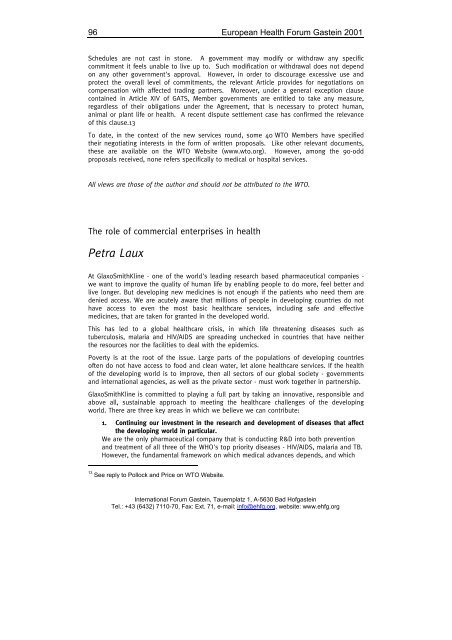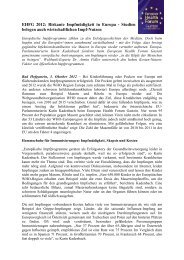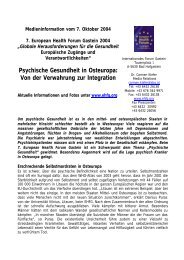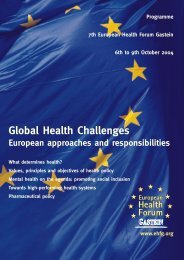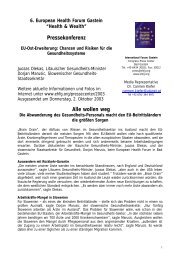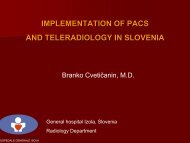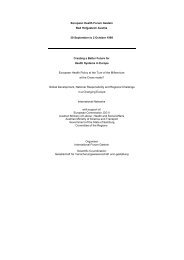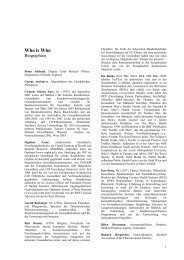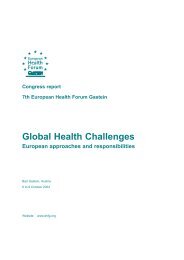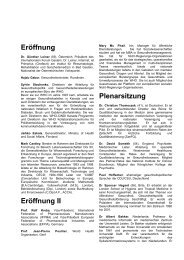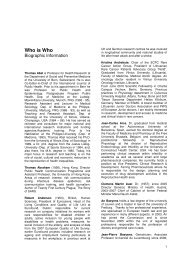Congress report - European Health Forum Gastein
Congress report - European Health Forum Gastein
Congress report - European Health Forum Gastein
You also want an ePaper? Increase the reach of your titles
YUMPU automatically turns print PDFs into web optimized ePapers that Google loves.
96<br />
<strong>European</strong> <strong>Health</strong> <strong>Forum</strong> <strong>Gastein</strong> 2001<br />
Schedules are not cast in stone. A government may modify or withdraw any specific<br />
commitment it feels unable to live up to. Such modification or withdrawal does not depend<br />
on any other government's approval. However, in order to discourage excessive use and<br />
protect the overall level of commitments, the relevant Article provides for negotiations on<br />
compensation with affected trading partners. Moreover, under a general exception clause<br />
contained in Article XIV of GATS, Member governments are entitled to take any measure,<br />
regardless of their obligations under the Agreement, that is necessary to protect human,<br />
animal or plant life or health. A recent dispute settlement case has confirmed the relevance<br />
of this clause.13<br />
To date, in the context of the new services round, some 40 WTO Members have specified<br />
their negotiating interests in the form of written proposals. Like other relevant documents,<br />
these are available on the WTO Website (www.wto.org). However, among the 90-odd<br />
proposals received, none refers specifically to medical or hospital services.<br />
All views are those of the author and should not be attributed to the WTO.<br />
The role of commercial enterprises in health<br />
Petra Laux<br />
At GlaxoSmithKline - one of the world's leading research based pharmaceutical companies -<br />
we want to improve the quality of human life by enabling people to do more, feel better and<br />
live longer. But developing new medicines is not enough if the patients who need them are<br />
denied access. We are acutely aware that millions of people in developing countries do not<br />
have access to even the most basic healthcare services, including safe and effective<br />
medicines, that are taken for granted in the developed world.<br />
This has led to a global healthcare crisis, in which life threatening diseases such as<br />
tuberculosis, malaria and HIV/AIDS are spreading unchecked in countries that have neither<br />
the resources nor the facilities to deal with the epidemics.<br />
Poverty is at the root of the issue. Large parts of the populations of developing countries<br />
often do not have access to food and clean water, let alone healthcare services. If the health<br />
of the developing world is to improve, then all sectors of our global society - governments<br />
and international agencies, as well as the private sector - must work together in partnership.<br />
GlaxoSmithKline is committed to playing a full part by taking an innovative, responsible and<br />
above all, sustainable approach to meeting the healthcare challenges of the developing<br />
world. There are three key areas in which we believe we can contribute:<br />
1. Continuing our investment in the research and development of diseases that affect<br />
the developing world in particular.<br />
We are the only pharmaceutical company that is conducting R&D into both prevention<br />
and treatment of all three of the WHO's top priority diseases - HIV/AIDS, malaria and TB.<br />
However, the fundamental framework on which medical advances depends, and which<br />
13 See reply to Pollock and Price on WTO Website.<br />
International <strong>Forum</strong> <strong>Gastein</strong>, Tauernplatz 1, A-5630 Bad Hofgastein<br />
Tel.: +43 (6432) 7110-70, Fax: Ext. 71, e-mail: info@ehfg.org, website: www.ehfg.org


